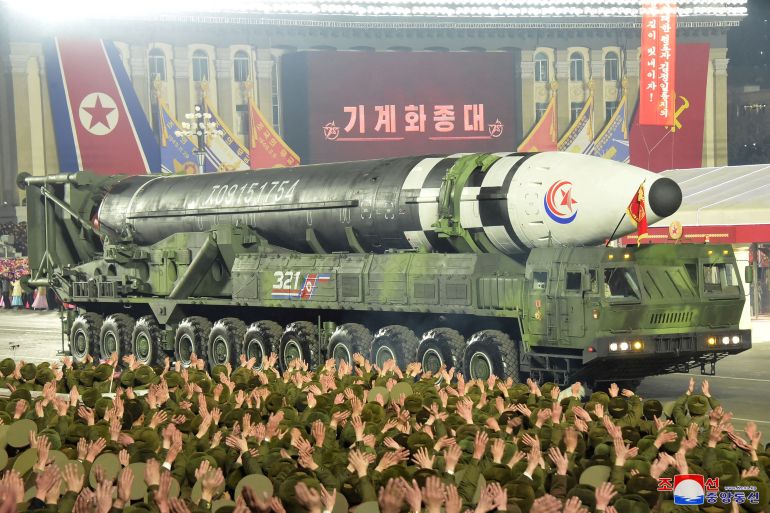| Introduction to North Korea’s Current Status | North Korea, officially known as the Democratic People’s Republic of Korea (DPRK), remains one of the most secretive and isolated countries in the world. For decades, the regime led by the Kim family has held firm control over its people and maintained a confrontational stance with the United States. But what’s happening today? Let’s look at the latest developments that have raised eyebrows internationally. |
| A Quick Overview of North Korea’s Recent Actions | In recent months, North Korea has ramped up its missile tests and made bold statements regarding its military advancements. With the U.S. keeping a watchful eye, the North Korean government has also engaged in some diplomatic exchanges, albeit with mixed results. These actions are seen as a sign of North Korea’s ongoing strategy of projecting power while maintaining pressure on the United States and its allies. |
| The U.S. and North Korea: A Complex Relationship | The relationship between the U.S. and North Korea has always been turbulent, marked by periods of dialogue and conflict. The two countries are stuck in a cycle of distrust, with North Korea’s nuclear ambitions at the heart of the tension. Despite occasional moments of hope, such as the summits between President Trump and Kim Jong-un, the underlying issues persist. |
| North Korea’s Diplomatic Engagements with the U.S. | Over the past few years, North Korea has tried to engage diplomatically with the U.S., especially under the leadership of Kim Jong-un. These talks, which at times seemed promising, have often faltered due to differing expectations and demands from both sides. |
| Summit Talks: A History of Failed Negotiations | One of the most significant diplomatic efforts in recent years was the 2018 summit between U.S. President Donald Trump and Kim Jong-un. While it was historic in nature, it failed to deliver tangible results. The talks focused on denuclearization, but the gap between North Korea’s demands and U.S. expectations led to a breakdown in negotiations. |
| The Role of Sanctions in U.S.-North Korea Relations | Sanctions have been a cornerstone of U.S. policy towards North Korea. Aimed at curbing its nuclear program, these sanctions have severely impacted the North Korean economy. However, North Korea continues to develop its weapons program, demonstrating that sanctions alone may not be enough to force change. |
| How Sanctions Impact North Korea’s Economy | The economic sanctions imposed on North Korea have caused widespread shortages and economic hardships. From restricted trade to limited access to international financial systems, the sanctions have put immense pressure on the North Korean regime. But, despite these hardships, North Korea’s leadership seems determined to push forward with its military goals. |
| Sanctions and North Korea’s Military Developments | Interestingly, the sanctions have not deterred North Korea from advancing its missile and nuclear capabilities. On the contrary, these sanctions may have intensified North Korea’s focus on military self-reliance, with the regime continuously upgrading its arsenal to counter any perceived threats. |
| North Korea’s Nuclear Program and U.S. Concerns | North Korea’s nuclear ambitions remain one of the most pressing issues in international politics. The United States views North Korea’s weapons program as a direct threat to regional and global security, which has led to increased tensions between the two countries. |
| North Korea’s Recent Missile Tests: What’s at Stake? | North Korea has carried out several missile tests in the past year, each more advanced than the last. These tests are seen as provocations, aimed at demonstrating the country’s growing military capabilities. The tests not only escalate tensions with the U.S. but also with neighboring countries like South Korea and Japan. |
| The U.S. Response to North Korea’s Nuclear Advancements | The United States has consistently condemned North Korea’s missile tests and nuclear advancements, using a combination of diplomatic efforts, sanctions, and military preparedness. However, these responses have had limited success in halting North Korea’s progress. The U.S. continues to push for a return to denuclearization talks, but with little hope of substantial progress. |
| Diplomatic or Military Actions? | The U.S. faces a tough decision in handling oregonnewsalert.com escalating threats. While diplomatic negotiations have been the preferred approach, military action remains an option on the table. The balance between these two strategies will likely define the future of U.S.-North Korea relations. |
| The U.S. and South Korea’s Joint Military Exercises | The U.S. and South Korea regularly conduct joint military exercises, which North Korea views as provocative. These exercises, often large in scale, are a key point of contention in the region, and North Korea has repeatedly condemned them as rehearsals for an invasion. |
| Why These Exercises Are So Controversial | From North Korea’s perspective, the U.S.-South Korea military drills are a direct threat to its sovereignty. Despite being defensive in nature, these exercises are seen as a practice run for potential military action against North Korea. This causes a constant cycle of tension and distrust. |
| North Korea’s Response to U.S.-South Korea Exercises | In response to these military exercises, North Korea has often ramped up its own military activities, including missile tests and other forms of military demonstrations. This cyclical tension only fuels the ongoing standoff between the two Koreas, with the U.S. caught in the middle. |
| The Role of China and Russia in U.S.-North Korea Relations | China and Russia play crucial roles in the dynamics of U.S.-North Korea relations. Both countries have strategic interests in the region and often serve as intermediaries or supporters of North Korea in international forums. |
| China’s Strategic Interests in North Korea | China has a long-standing relationship with North Korea, mainly due to geographical proximity and shared communist ties. However, China has increasingly found itself at odds with North Korea’s missile and nuclear ambitions, despite providing economic and diplomatic support. |
| The Role of Russia in North Korea’s Diplomatic Landscape | Russia’s influence in North Korea has been less direct than China’s, but it is nonetheless significant. Russia has expressed concern over the rising tensions and has advocated for a more diplomatic approach, often aligning with China to counter U.S. pressure on North Korea. |
| The U.S. Public’s Perception of North Korea Today | How does the average American view North Korea today? Given the complexity of the situation, public opinion tends to fluctuate. Media coverage and political rhetoric shape perceptions of North Korea and influence how the U.S. government handles the relationship. |
| How Media Coverage Shapes Public Opinion | The media plays a huge role in shaping the American public’s view of North Korea. Depending on the tone and content of the coverage, North Korea can be portrayed as either a rogue state or a potential partner for peace. These portrayals influence how the public reacts to government policies. |
| The Impact of North Korean Propaganda on American Views | North Korea also uses propaganda to influence global opinion, often emphasizing its strength and resistance to U.S. intervention. This propaganda is directed not only at the North Korean people but also at foreign audiences, including Americans, to portray the regime in a favorable light. |
| North Korea’s Cyber Activities and U.S. Security Concerns | In addition to its military advancements, North Korea has increasingly engaged in cyber warfare. This has raised alarms in the U.S. about the potential threats posed by North Korea’s ability to disrupt global systems through cyber attacks. |
| A Rising Threat: Cyber Attacks Linked to North Korea | North Korea has been linked to several high-profile cyber attacks in recent years, including hacking campaigns targeting businesses and government entities. These attacks have been viewed as a means for the regime to bypass international sanctions and maintain its operations. |
| Conclusion: What’s Next for U.S.-North Korea Relations? | The future of U.S.-North Korea relations remains uncertain. While there is the possibility of diplomatic breakthroughs, North Korea’s commitment to its nuclear program continues to be a major obstacle. The U.S. will need to navigate a fine line between pressure and engagement, with global security hanging in the balance. |



